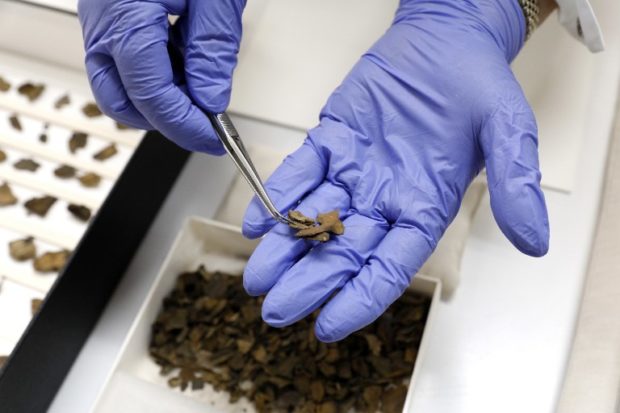Five Dead Sea Scroll fragments fake – US museum

A conservator uses tweezers to hold fragments of a Dead Sea scroll, at the scrolls’ conservation laboratory of the Israel Antiquities Authority in Jerusalem on May 2, 2018. The Dead Sea Scrolls are a collection of hundreds of biblical texts in Hebrew, Aramaic, and Greek discovered 45 years ago in the Qumran Caves near the Dead Sea. AFP
WASHINGTON, United States – A US museum announced Monday that five artifacts it had said were fragments of the ancient manuscripts known as the Dead Sea Scrolls are in fact fake, and will no longer be displayed.
Washington’s Museum of the Bible — which stirred controversy last year for its financial backing from a billionaire evangelical Christian — removed the pieces from exhibition after a German research institution concluded that they weren’t old enough.
“Though we had hoped the testing would render different results, this is an opportunity to educate the public on the importance of verifying the authenticity of rare biblical artifacts, the elaborate testing process undertaken and our commitment to transparency,” the museum’s chief curator Jeffrey Kloha said in a statement.
“As an educational institution entrusted with cultural heritage, the museum upholds and adheres to all museum and ethical guidelines on collection care, research and display.”
The Dead Sea Scrolls, which include the oldest known manuscripts of the Hebrew Bible, date from the 3rd century BC to the 1st century AD.
Article continues after this advertisementNumbering around 900, they were discovered between 1947 and 1956 in the Qumran caves above the Dead Sea.
Article continues after this advertisementThe five removed fragments had been exhibited in the sprawling museum since it opened in November 2017, but were labeled with explanations that research on their legitimacy was underway.
In April last year the museum sent five of its 16 Dead Sea Scroll pieces to Germany’s Federal Institute for Materials Research and Testing (BAM) for testing after previous studies questioned their authenticity.
One researcher, Kipp Davis of Trinity Western University, had published work saying “at least seven fragments in the museum’s Dead Sea Scrolls collection are modern forgeries.”
The museum has removed the five pieces tested in Germany from display and replaced them with three others, which are also the focus of further analysis.
The Museum of the Bible raised eyebrows even before opening its giant bronze, Latin-inscribed gates: its primary financial backer is billionaire Steve Green, whose arts and crafts chain Hobby Lobby has supported conservative causes in Washington.
Just months before the museum opened the company was forced to pay a $3 million settlement and give up 5,500 artifacts — including ancient clay cuneiform tablets from Iraq — that the US Justice Department said were illegally imported.
The Green family’s Christian convictions and the smuggling debacle had skeptics questioning both the museum’s ideological aim and the provenance of its antiquities.
At the opening Green, who chairs the museum’s board, said the institution aims only to “present the facts.” /cbb